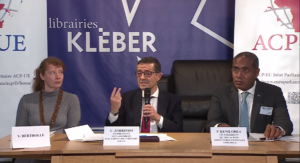Initialled by the chief negotiators two years ago, the post-Cotonou agreement has been slow to be jointly signed by the European Union and the Organisation of African, Caribbean and Pacific States. The ACP countries are ready but the EU is still dragging its feet. At the recent session of the Joint Parliamentary Assembly, some parliamentarians expressed their wish to see the Europeans speed up their internal procedures. (Le Mandat)
Internal procedures within the European Union are blocking the signing of the Post-Cotonou Agreement, although it was initialled by the representatives of both parties on 15 April 2020. Initially, some European countries, such as Hungary, were reticent about certain clauses of the new agreement, especially on the issue of migration. However, in order for it to enter into force, the entire 27-member bloc must approve the agreement in question.
Europeans stall
As she was travelling to Kiev, the president of the European Parliament, Roberta Metsola left a pre-recorded video, played at the opening of the 41st session of the ACP-EU Joint Parliamentary Assembly, in which she tried to be reassuring. “I hope that the new agreement will be signed without delay by all parties so that next time we can meet under the new rules”. For his part, the co-president of the ACP-EU joint parliamentary assembly, Carlos Zorrinho also believes that it is urgent to finalize the post-Cotonou agreement, “the negotiations of which were concluded two years ago”. “I really hope that it could be possible to finish that during the French Presidency”. Therefore, the Portuguese hopes that the new agreement will be signed before the end of June, as France’s mandate at the head of the Council of the European Union expires on 30 June. The Cotonou Agreement will also remain in force until 30 June after the recent extension of the deadlines unless both parties sign the new agreement by then.
The ACP is pressing
The Organisation of African, Caribbean and Pacific States is only waiting for the end of the internal procedures within the European Union. “The OACPS is concerned about the considerable delay on EU side to complete the internal processes that would allow for the signing of the agreement”, said the co-secretary general of the ACP-EU joint parliamentary assembly, Geaorges Rebelo Pinto Chikoti. The Angolan also recalled the ACP states’ position that the new agreement will be called the Samoa Agreement “with the expectation that the signing will take place in the capital of the Independent State of Samoa, Apia”.
Is the post-Cotonou agreement losing its political importance?
Could the absence of a signature cause the post-Cotonou agreement to lose its political importance? The question was raised during the press conference on 1 April. On the ACP side, Joint Parliamentary Assembly Co-President Peter Kenilorea replied that his group was ready to provide any support that would move things forward. “We don’t think that the slowness of it is impacting the relevance of the group. I think the relevance of the group speaks for itself in terms of the unique position that this group can bring to discussions, including on global issues”, he added. On the EU side, the co-chair of the Joint Parliamentary Assembly Carlos Zorrinho gave a half-hearted justification for the delay in signing the agreement, citing the innovations contained in the post-Cotonou agreement and the time remaining before the end of the French presidency of the EU Council.


Undeniably consider that that you stated. Your favorite justification appeared to
be at the web the simplest thing to take note of. I say to you,
I definitely get annoyed whilst other people think about concerns that
they plainly don’t realize about. You managed to hit the
nail upon the highest and defined out the entire thing without having side effect
, folks could take a signal. Will likely be back to
get more. Thanks
I quite like reading a post that will make people think.
Also, many thanks for allowing me to comment!